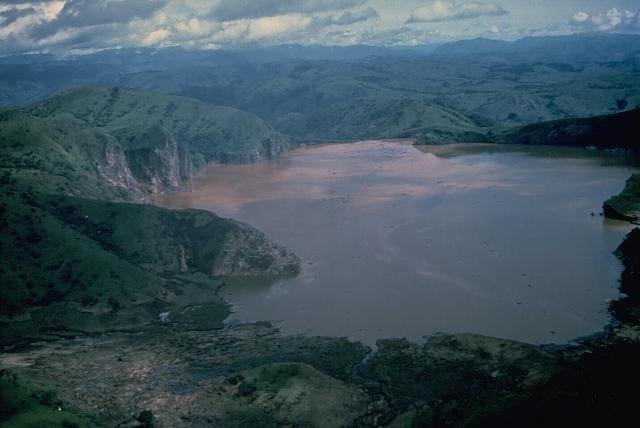
Photo: Jack Lockwood
I incorrectly had lakes on my list of things that don’t explode. (Yes, I do have lists like this on long rolls of parchment.) Well turns out I’m wrong – there are three exploding lakes on our crazy planet.
Lake Nyos in Cameroon is the second largest at about 390 acres, but more importantly it is the deadliest lake according to The Guinness Book of World Records (people that actually do keep track of that stuff). One would think that a deadly lake would be one that drowns a lot of people. Maybe some rip tides or something. Nope. Exploding lakes are much deadlier.
So how do lakes explode? Hot magma under Lake Nyos leaks carbon dioxide into the water, saturating it with an estimated 90 million tonnes of CO2 (a tonne is a metric ton or, equal to 2205 lbs). Most of the time this is not an issue – the CO2 sits in the water quite peacefully. But over time the water because supersaturated and a change in the environment can lead to large amounts of CO2 splurging out of the water.
And this is exactly what happened on one unlucky day in 1986. A volcanic eruption or landslide forced over 80 million cubic meters of CO2 into the air at once. This is the equivalent of 80,000 Americans’ CO2 emissions for an entire year entering the atmosphere at once. It was so forceful it knocked down the nearby trees and caused a tital wave over 80 feet high. From the Washington post:
The effect was similar to rapidly uncapping an agitated bottle of beer. Only in this case, the bottle was a mile and a quarter long, three-quarters of a mile wide and 610 feet deep, with five times as much carbonation.
The gas spilled over the lip of the lake into the valley below, displacing all the air surrounding air on the way. Since CO2 is roughly 1.5 times thicker than air, it hugged the earth and suffocated anyone unlucky enough to be sleeping in the low points within 16 miles of the lake. A 50 meter high cloud of CO2 traveled through the night silently killing 1,700 people and 3,500 livestock.
Rather than leaving you on that depressing note, you will be glad to hear that they are taking measures to make sure this doesn’t happen again. There have been pipes installed to bring some of the deepest water up to the surface – the goal being to agitate the water enough so that it never again becomes supersaturated with CO2.

rip tides in a lake?
Also “with five times as much carbonation.”…five whole beers of carbonation being released all at once! Catastrophe!
Also – Exploding Trees: http://www.npr.org/templates/story/story.php?storyId=4571982
Haha rip tides … or something like it … maybe not. Before reading this post, what did you think would be the top method of killing for lakes?